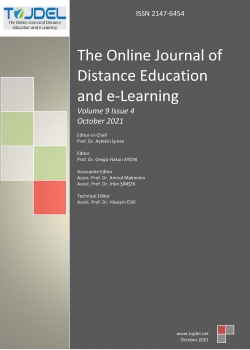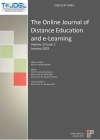TOJDEL - Volume 9 - Issue 4 - October 2021
 EXPERIENCES OF TEACHERS ON ONLINE TEACHING AT HIGHER EDUCATION LEVEL DURING COVID-19 PANDEMIC
EXPERIENCES OF TEACHERS ON ONLINE TEACHING AT HIGHER EDUCATION LEVEL DURING COVID-19 PANDEMIC Sudarshan Mishara, Ajaya Kumar Mohanty
Abstract:
The COVID-19 pandemic has been caused for closing down of all institutions imparting face to face mode of teaching globally. In India, the UGC instructed all its institutions running regular courses to opt online classes during the pandemic. The state of Odisha is adhering the decision of the UGC. The present survey is intended to study the experiences and problems confronted by the teachers during and after online classes. The undergraduate, postgraduate and research degree teachers participated in the online survey in a sizable number. The teachers’ engagement before and during classes characterized by preparation of class note and PPT, asking questions to students for making the class interactive, sharing of reading materials, delivery of lecture on the content and clearing of students’ doubts. The post class engagements are collection of assignment for checking, collection of feedback from students and reflection for improving the teaching etc. The benefits of online classes to teachers are; it saves time in course coverage and have increased their presentation, communication and interpersonal skills along with increased exposure to collaborative technologies. The suggestions for improvement of online classes directly related to exposure of teachers towards online pedagogy and collaborative technology, increased online infrastructure at the institutional and state level, ensuring the preparation of E-learning materials and handhold support to financially poor students.
 EXPLORATION IN COVID-19 PANDEMIC: ANALYSIS AND ASSESSMENT OF ONLINE LEARNING WITH OFFLINE LEARNING IN THE CONTEXT OF STUDENTS
EXPLORATION IN COVID-19 PANDEMIC: ANALYSIS AND ASSESSMENT OF ONLINE LEARNING WITH OFFLINE LEARNING IN THE CONTEXT OF STUDENTS Swati, Ankur Sisodia
Abstract:
As the outbreak of COVID-19 is going on in every country whether it is developed or developing. Education is equally important for wealth and health as well as for the growth of any country, but for the foundation of every country, education plays an essential role. Since this pandemic has forced all nations to force lockdowns across the board. Due to this, they have to go for the online education and adopt innovative methods of teaching. Therefore, they now need to adopt new strategies & policies in response to this. These policies can be beneficial to our education system and also for students as it can decrease the work load of both the students and teachers. As we know that from various studies we have analysed that study loads of students is increased so much that they are not able to cope with all the curriculum easily and positively. These innovative methods also opens the doors of technical aspects to the teachers and students who never dream about to use these technologies, but every positive things have some darker side also as it cannot be easily adaptable to all. In this paper, we try to consider all positive and negative aspects of online studies by making a small survey with the help of some number of students of different organizations and try to compare all the aspects of online and offline studies with certain imaginary parameters like Understanding of the subject, Interaction with Teacher, Student Satisfaction, Assignment submission, Liking for study material and acceptability.
 EXPLORING EFFECTIVENESS OF ONLINE WORKSHOP FOR ODL LEARNERS: A CASE STUDY OF YOGA PROGRAMME
EXPLORING EFFECTIVENESS OF ONLINE WORKSHOP FOR ODL LEARNERS: A CASE STUDY OF YOGA PROGRAMME Gagan Singh, Gopal Datt, Bhanu Prakash Joshi
Abstract:
Due to the global pandemic of COVID 19, the use of online learning technologies becomes the necessity of every educational institution. This study aims to analyses the effectiveness and challenges of the online workshop conducted for the learners of the Yoga programme of Uttarakhand Open University, India. In such a pandemic situation where face-to-face teaching-learning seems somehow impossible. This study is descriptive research where a self-prepared and varified questionnaire was floated online (i.e. e-mail, WhatsApp) among the enrolled learners of the Yoga programme to collect the primary data. To find out the learner's attitude towards the online workshop, a total of 410 complete responses were received and analyzed. The findings of the study reflect that the online practical (i.e.- Aasana, Advanced Aasana, Mudra Bandha, Pranayama, and Surya Namaskar) and theory (i.e.- Fundamentals of Yoga, Anatomy, Yoga and Health, Naturopathy, Yoga Therapy, etc.) sessions of the Yoga, were extremely useful for the participants irrespective of gender. In the case of barriers faced by the learners during the online workshop, lack of Internet access and speed ranks first followed by lack of dedicated time to join the online workshop. Several other barriers out of the total surveyed 10 barriers are also of key attention, such as- lack of sufficient prior academic knowledge, and lack of preferred language. This study also helps to analyze and find out further solutions to improve the impact and reachability of online workshops of different subjects in the Open and Distance Learning mode.
 IMPACT OF COVID-19 ON EDUCATION SYSTEM IN INDIA: CHALLENGES, OPPORTUNITIES AND TASK AHEAD
IMPACT OF COVID-19 ON EDUCATION SYSTEM IN INDIA: CHALLENGES, OPPORTUNITIES AND TASK AHEAD Anurupa Mukherjee, Pravat Kumar Kuri
Abstract:
Country’s education system has not been escaped anywise from the incidence of COVID-19 crisis. Problems such as region and gender specific digital divide came to our notice when all educational institutions were ordered to close and there was a terrible reliance on digital education. On the other hand, the increasing emphasis on online education system gives rise to second best alternative way out to combat the stagnancy of entire education system of India. In spite of continuous efforts by both the central and state governments in expanding the system, 100 percent of the student population could not be covered under e-learning. In the absence of classroom learning, learning gap has been developed because of economic hardship, patriarchal societal structure, inequality in having digital device and carrying its usage costs, incognizance about the e-learning concept, digital illiteracy among smart phone users etc. Needless to say, the appropriate integration of classroom teaching in collaboration with e-learning will serve a new dimension to the entire education system through the expansion of inclusive education system in the near future.
 ONLINE EVALUATION: A VIABLE ALTERNATIVE FOR CONTEMPORARY TIMES
ONLINE EVALUATION: A VIABLE ALTERNATIVE FOR CONTEMPORARY TIMES Manjulika Srivastava, P. Vijayakumar, Bijayalaxmi Mishra, Navita Abrol, Shekhar Suman
Abstract:
The immediate adoption of online methods of teaching, learning, and evaluation is imperative for survival in the Digital Age. An attempt has been made to highlight the need for the shift to online methods of evaluation and suggest appropriate model based on existing practices in different countries. The existing online examination models have been identified and reviewed doing a SWOC (Strengths, Weaknesses, Opportunities and Challenges) analysis. Based on which, an Online Student Evaluation Model has been developed suitable for Open and Distance Learning (ODL) institutions that cater to the educational requirements of an abnormally large number of learners who are geographically dispersed and heterogeneous; and include disadvantaged and marginalized sections.
 PEDAGOGICAL AND TECHNICAL PROBLEMS ENCOUNTERED BY THE PRE-SERVICE TEACHERS DURING THE VIRTUAL INTERNSHIP
PEDAGOGICAL AND TECHNICAL PROBLEMS ENCOUNTERED BY THE PRE-SERVICE TEACHERS DURING THE VIRTUAL INTERNSHIP K. Thiyagu
Abstract:
The paper is intended to measure the level of the problem encountered by the pre-service teachers during virtual Internship. Therefore, the investigator adopted a normative survey to collect the data in this study of Pre-service teachers' problems towards virtual Internships in the Kasaragod district. Using the normative survey method, the investigator gathered information regarding Pre-service teacher's problems during virtual Internships. In this study, all the pre-service teachers studying in the Bachelor of Education Programme in Kasaragod have been taken as the population for the study. Two hundred forty pre-service teachers were selected as a sample of the study in a simple Random sampling method. The investigator prepared the tool to measure the problems of pedagogical aspects and technical issues encountered during the virtual internship. The findings of the study were: 40 (16.7%) of the sample have low level, 160 (66.7%) of the sample have moderate level, and 40(16.7%) of sample have a high level of problems encountered during virtual Internship. The pre-service students faced pedagogical challenges during the virtual internship. Similarly, most of the pre-service trainees were faced technical issues during the virtual internship.
 TEACHERS’ ATTITUDES TOWARDS VIRTUAL TEACHING DURING COVID-19 PANDEMIC
TEACHERS’ ATTITUDES TOWARDS VIRTUAL TEACHING DURING COVID-19 PANDEMIC Sankar Kar
Abstract:
To control the spread of Corona virus outbreak in India, a nationwide lockdown had been started in India since 25th March 2020. All educational institutes have been closed since March 16 in West Bengal. The 2020 academic year is a period of darkness in the lives of students due to the Covid-19 epidemic lockdown. West Bengal Education Minister urges stakeholders to consider alternative plans to complete the syllabus after a long shutdown. Therefore, many schools started resuming their sessions through e-learning portals. As a result, e-learning strategies have gained momentum as well as become an important contemporary trend in education during the lockdown. In the lockdown period, both the students & teachers have to access knowledge via ICT (Information Communication Technology) to keep pace in the current information society. ICT reduces the barrier of social distancing as well as the impact of shut down on the education sector with the help of digital transformation in the Indian education system. During lockdown being a digital transformation of education does not mean teachers are willing and natural digital teachers. It is important to know from teachers during lockdown what their knowledge, their skills, their expectations and their perception of e-learning. The main aim of this study is to explore the attitude of secondary school teachers’ towards virtual teaching during lockdown at Gaighata Block of North 24 Parganas in West Bengal. A descriptive cross-sectional study was conducted to know the attitude of teachers’. A convenient sampling technique was used to select the participants for the study. Data has been collected with the help of Likert type attitude scale using Google Form during the Covid-19 pandemic lockdown. During the lockdown, the result of this study indicates that the attitude towards virtual teaching is not satisfactory. Moreover, male teachers develop a more favourable attitude toward online teaching than female teachers. This study also proved that more experienced teachers show less interest in virtual teaching-learning than less experienced teachers.
 THE FORMS AND ANTECEDENTS OF INCOVOLITY IN ONLINE CLASSROOM: AN ANALYSIS IN INDIAN CONTEXT
THE FORMS AND ANTECEDENTS OF INCOVOLITY IN ONLINE CLASSROOM: AN ANALYSIS IN INDIAN CONTEXT Aditi Gupta, Ashiska Sharma, Patiraj Kumari
Abstract:
The current situation of COVID 19 not only involves global health crisis but also economic and social crises. It has brought about a change in the system of education by conducting all academic activities online. Acc. to ILO, a world of universal distance education (as nearly 94% of learners have faced school closures) is created. Online education is a new concept for most Indians, creates room for incivility. Incivility is defined as a lack of manners, courteousness, and respect which deteriorates the decorum leading to disturbance in teaching and learning of the class. This study is focused on incivility in online teaching and learning. A total of 70 college students from around the country were asked to fill an open-ended online questionnaire to know their views on incivility in the online classroom. The overall thematic analysis resulted in the identification of three themes i.e. reported incidents, possible causes, and measures to reduce incivility in the online classrooms. In the time of pandemic where almost all the dissemination of education is done online to minimize the effect of the pandemic on the education system, incivility is a stumbling block. Therefore, it is important to bring incivility in online education in limelight as tackling incivility is the need of the hour.


